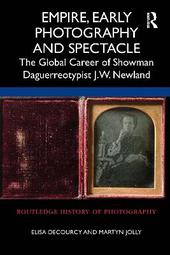
|
Empire, Early Photography and Spectacle: The Global Career of Showman Daguerreotypist J.W. Newland
Hardback
Main Details
Description
James William Newland's (1810-1857) career as a showman daguerreotypist began in the United States but expanded into Central and South America, across the Pacific to New Zealand and colonial Australia and onto India. Newland used the latest developments in photography, theatre and spectacle to create powerful new visual experiences for audiences in each of these volatile colonial societies. This book assesses his surviving, vivid portraits against other visual ephemera and archival records of his time. Newland's magic lantern and theatre shows are imaginatively reconstructed from textual sources and analysed, with his short, rich career casting a new light on the complex worlds of the mid-nineteenth century. It provides a revealing case study of someone brokering new experiences with optical technologies for varied audiences at the forefront of the age of modern vision. This book will be of interest to scholars in art and visual culture, photography, the history of photography and Victorian history.
Author Biography
Elisa deCourcy is a specialist in early photography and a Research Fellow in the Research School of Humanities and the Arts at the Australian National University. Martyn Jolly is Honorary Associate Professor in the School of Art and Design at the Australian National University and was Lead Chief Investigator on the Australian Research Council Project 'Heritage in the Limelight: The Magic Lantern in Australia and the World'.
Reviews"Driven by some extraordinary research, this fascinating book traces the itinerant career of nineteenth-century photographer and projectionist J.W. Newland as he restlessly traverses the world in search of images and customers. Offering a new way of understanding the early history of photography, deCourcy and Jolly embed Newland's story in an intricate global network of spectacle and exchange. The end result is a brilliant exposition of one man's working life that also illuminates the advent of the modernity in which we all still live." Professor Geoffrey Batchen, University of Oxford "This fascinating book turns on its head ideas about Empire, and indeed colonial, visual culture. As it makes clear, many more people encountered images of Empire in theatres, music halls and popular lectures than through fine art. Empire, Early Photography and Spectacle helps address the common over-emphasis on paintings and prints when describing how empires illustrated themselves. The reality, as this book demonstrates, is a much more messy, less linear, often technology-based conflation of images, which are teased out through this eminently readable text. By its focus on someone apparently inconsequential, something of real substance and importance emerges." Richard Neville, Mitchell Librarian, State Library of New South Wales "Original, thoughtful, and remarkably readable, this book presents a fascinating story of international and inter-imperial mobility during the mid-nineteenth century. In tracking the itinerant career of the daguerrotypist J. W. Newland across the margins of global empires, deCourcy and Jolly consider the significance of the showman as a shrewd negotiator of colonial and other networks, finding a mixed media space at work in territories from the United States, to the Pacific Islands, Australia and India. An extraordinary global research project in its own right, this book discovers a diversifying trade in cultural goods in this period, offering enlightening insights not only to media and art historians, but also to observers of contemporary global media spaces." Professor Joe Kember, University of Exeter "Empire, Early Photography and Spectacle takes the career of British daguerreotypist and showman J.W. Newland as a central device to explore the volatile world of image production, consumption and transnational cultural exchange in the mid nineteenth century. Exquisitely researched and written with extensive illustrations, this book draws on international archival material, images, historical and biographical data to consider the relationship of one itinerant photographer to the global explosion of image making and visual culture. Through this important and richly illustrated study deCourcy and Jolly reveal both the historical and ongoing relevance of photography as a global visual media." Associate Professor Donna West Brett, University of Sydney "A dazzling and dynamic journey through a world on the brink of an enormous expansion in global visuality. Empire, Early Photography and Spectacle is a major achievement, offering a new way of understanding the intertwined complex of optical technologies, visual experiences, practices, and audiences across multiple sites of empire in the 1840s and 1850s." Associate Professor Jennifer Tucker, Wesleyan University "Much more than an episode in the history of photography, Elisa deCourcy and Martyn Jolly's book is an excavation into the emergence of modern media culture. The biography of photographer and performer James William Newland is turned into a chapter of the wider biography of entertainment media, providing us with a powerful testimony of how the new appetite for mediated entertainments emerged and developed across the globe in the mid nineteenth century." Dr Simone Natale, editor of Photography and Other Media in the Nineteenth Century
|